OFF THE GRID
Honors College seminar courses challenge students beyond the classroom
This spring, East Carolina University Honors College students spent time learning way outside the classroom – on the Appalachian Trail, 15 feet underwater and behind a camera lens in eastern North Carolina.
Those out-of-the-box experiences – touching both ends of the state – happened in Honors College seminars. Innovative courses designed and taught by ECU faculty members supplement the regular curriculum and feature small classes, guest speakers and field trips.
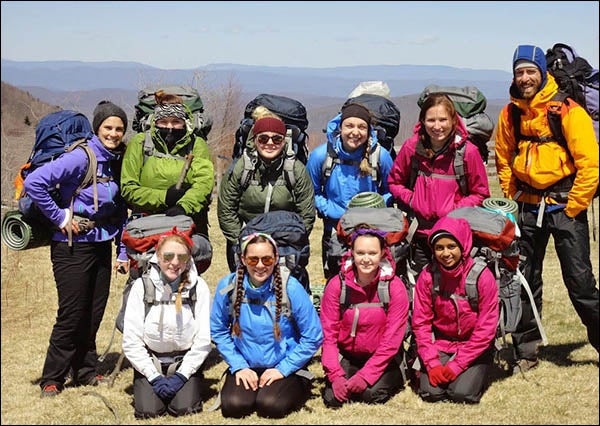
Among the ECU hikers on the Appalachian Trail were, front row left to right, Sarah Evancho, Brooke Benson, Kendra Shuford and Mona Amin; back row left to right, Ashley Rhinehardt (trip instructor, ECU Adventure Program), Claire Tuttle, Leah Price, Jill Collins, Courtney Murphy and Brad Beggs (assistant director, ECU Adventure Program)
Honors College students are required to take two of the seminars before they graduate, but several said the courses are a want-to, not a must-do.
“I want to take advantage of every opportunity I can,” said ECU sophomore Claire Tuttle, who is majoring in business management information systems. “This semester, I just wanted to do something different. Why would you not do it?”
She enrolled in “Along the AT: Experiences and Reflections on the Appalachian Trail,” which culminated with a four-day hike in April.
Although Tuttle had been camping many times with her parents, she had no experience backpacking. Still, Tuttle said her biggest fear wasn’t climbing mountains but not knowing anyone in the class when she signed up.
“It was really cool to get to know people,” she said, describing how much she enjoyed talking around campfires, sharing the responsibility of cooking food and setting up and breaking down camp. She read for fun and kept a daily journal for the class. “It was definitely one of the best decisions I’ve made since coming to college.”
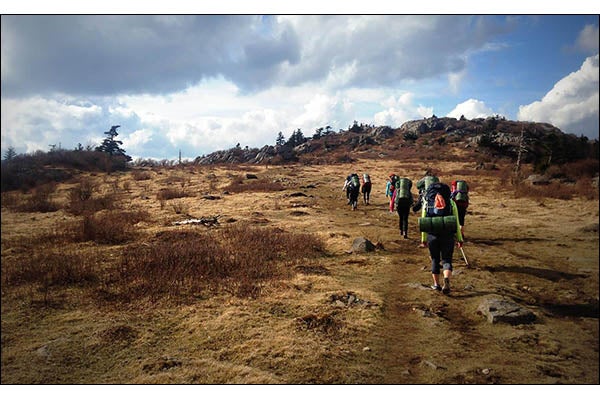
The trip helped Tuttle gain perspective on life, she said. She learned new things, from the history of the trail to how toothpaste can be toxic to the environment.
“When you’re out there, you realize human impact,” Tuttle said. “We take so much for granted, that’s for sure.”
Tuttle commended Brad Beggs in the ECU Adventure Program and faculty Traci Birch and Mary Beth Corbin for preparing students for the hike.
Freshman Leah Price of Wilmington had only been on a day hike before taking the class. “I was definitely a beginner,” she said.
“I had never even camped before overnight.”
She saw wild ponies and other wildlife, summited Mount Rogers in Virginia and enjoyed meeting “through-hikers” in the process of hiking all 2,175 miles of the trail from Georgia to Maine.
It was a bonding experience for her group because there was no cellular service, so phones and social media were absent. “Being off the grid for four days is not easy,” she said. “It was refreshing. It was time to wind down from everything.”
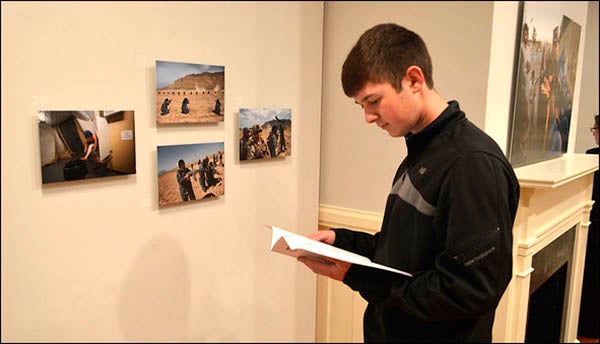
ECU junior and EC Scholar Trey Cook enjoyed exposure to the culture of eastern North Carolina in a documentary journalism course provided as an Honors College Seminar.
Students soldiered through hail, snow, thunderstorms and sunshine. “It was beautiful nonetheless,” Price said. The trip has inspired her to study abroad. “I feel like I can conquer the world now.”
Having the chance to learn something new guided ECU junior Trey Cook, a junior biochemistry major and EC Scholar from Cary. He explored Williamston, Plymouth and New Bern – towns he had never visited – by taking “Cultural Landscapes of Eastern North Carolina in Photography and Writing.”
The documentary journalism course taught by Daniel Kariko and Charles Twardy was a blend of photography and writing with an emphasis on the history of photography, journalism and photo editing techniques. Cook said he knew very little about photography before taking the class.
“I think the most monumental thing I learned was the concept behind art,” Cook said.
“True artists try to create thoughts and feelings in their audiences. Whether it is a painting, a dance or a photograph, what the art is composed of is not as important as the thoughts and feelings it instills in its admirers. That realization has revolutionized the way I look at art and given me a much greater appreciation for artists in all sorts of fields.”
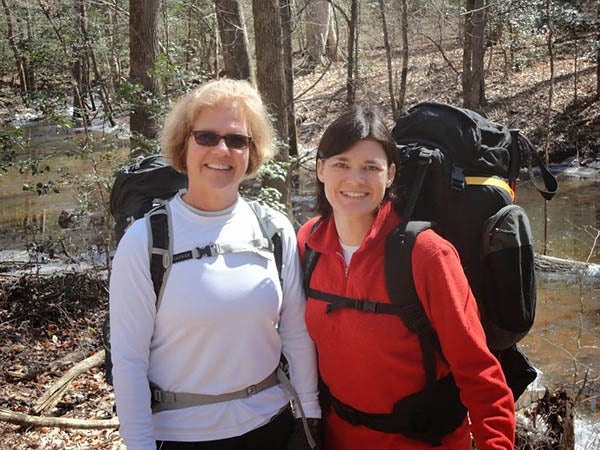
Faculty members Mary Beth Corbin, left, and Traci Birch led the Honors College Seminar on the Appalachian Trail.
While the class fulfilled fine arts credits that Cook needed, he said the format, professors and design of the class provoked student creativity and innovation. It also exposed him to the culture of eastern North Carolina, which is different from the metropolitan area where he grew up.
Rising senior Stephanie Griffin, a speech and hearing sciences major from Monroe, would scuba dive for the first time after enrolling in “Ocean Exploration: Shipwrecks, Conservation and Technology,” focused on the relationship between humans and the ocean, the Great Lakes and inland waters.
Highlights included seeing artifacts from Blackbeard’s ship, Queen Anne’s Revenge, on ECU’s west research campus, which helped reinforce the class material. “It’s great to see the conservation methods they’re doing,” she said.
The students did scuba diving in the diving well of Minges Natatorium on campus under the guidance of ECU instructor Clint Etheridge.
“I hope it provides an awareness and appreciation they might not otherwise have found,” said Dr. Tim Runyan, who created and teaches the class which fills up each spring. “I’m a hands-on guy. We do things rather than talk about them.”
Griffin spent her childhood visiting grandparents in Mann’s Harbor, where she learned an appreciation for the water. “But this is a whole different educational aspect,” she said.
Of the four books she read for class, Griffin most enjoyed “The Power of the Sea” by Bruce Parker, which emphasized the physics behind tides, rogue waves and tsunamis, natural disasters and climate change.
“This fulfills honors credit but in a fun way,” Griffin said. “It lets you taste a little bit of everything while you’re here.”
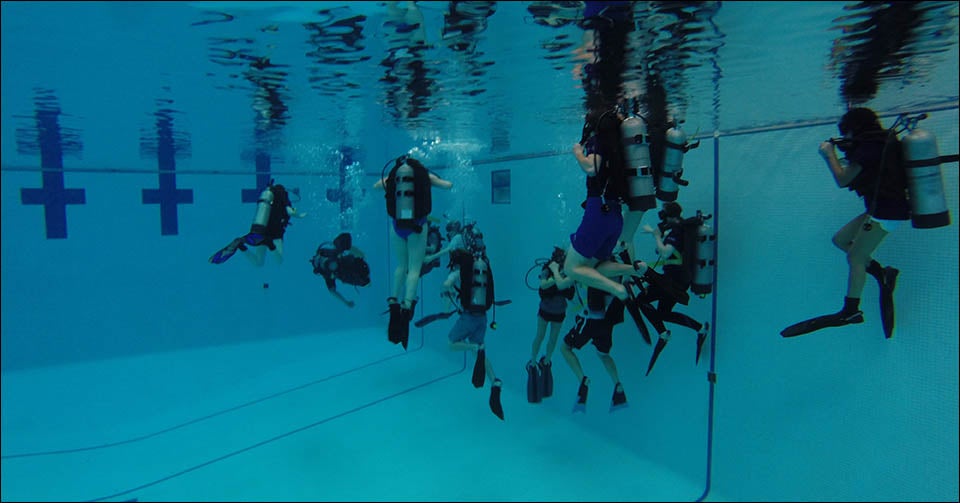
Dr. Tim Runyan’s spring semester ocean exploration class is shown in their first effort at scuba diving at Minges pool. (Submitted photo taken with a GoPro underwater camera).
